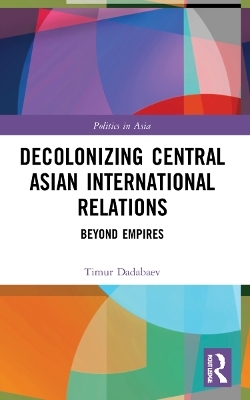
Decolonizing Central Asian International Relations
Routledge (Verlag)
978-1-032-00938-4 (ISBN)
This book unpacks the main narratives used in international relations to depict and explain existing inter-state relations in Central Asia, with a focus on the construction of fairer international relations along the Silk Road.
The book points to the need to decolonize international relations in the Central Asian region to present a fair representation of the regional states in international affairs. In doing so, the book exposes the concepts and stereotypes that have been imposed on the Central Asian region by dominant assumptions in contemporary international relations. Offering empirical grounding for alternative views, the author suggests that Western international relations make the same mistakes in the Central Asian region that the Russian Marxists made when they attributed a narrative of modernity along the lines of the progress made in Germany and Russia. In such a structure, both Russian Marxist attempts and liberalist Western ideas disregard the fact that the region has its own model of modernity and progress, which does not necessarily involve an appeal to the modern nation state, ethnicity and state building. The book sheds lights on the prospects of coordinated development of Central Asia and Afghanistan. It also provides insights into the development of post-Socialist Asia in its relations with Russia, China, Japan and South Korea.
Contributing to the task of placing Central Asia in discussions in the discipline of international relations, this book will be of interest to academics working in the fields of international relations and Asian politics, in particular Central Asian studies.
Timur Dadabaev is a Professor of International Relations and the Director of the Special Program for Japanese and Eurasian Studies at the Faculty of Social Sciences and Humanities, University of Tsukuba, Japan. His recent books include Transcontinental Silk Road Strategies (2019), Chinese, Japanese and Korean In-roads into Central Asia (2019), Japan in Central Asia (2016) and Identity and Memory in Post-Soviet Central Asia (2015).
1. Towards Decolonizing Central Asian International Relations 2. Critical Assessment of Contemporary Approaches to Central Asia 3. Manipulating Post-Soviet Nostalgia: Contrasting Political Narratives and Public Recollections in Central Asia 4. Emerging Japan-EU strategic partnership and its implications for Central Asia 5. De-securitizing the "Silk Road": Uzbekistan’s cooperation agenda with Russia, China, Japan and South Korea in the Post-Karimov Era 6. Connectivity, Energy and Decolonization: Uzbekistan’s strategy vis-à-vis Russia, China, South Korea and Japan 7. Decolonizing the Afghanistan-Central Asian relations Concluding remarks: Seven points for decolonizing agenda setting in Central Asia
| Erscheinungsdatum | 05.10.2021 |
|---|---|
| Reihe/Serie | Politics in Asia |
| Zusatzinfo | 15 Tables, black and white; 1 Line drawings, black and white; 1 Illustrations, black and white |
| Verlagsort | London |
| Sprache | englisch |
| Maße | 138 x 216 mm |
| Gewicht | 300 g |
| Themenwelt | Naturwissenschaften ► Geowissenschaften ► Geografie / Kartografie |
| Sozialwissenschaften ► Ethnologie | |
| Sozialwissenschaften ► Politik / Verwaltung ► Europäische / Internationale Politik | |
| Sozialwissenschaften ► Politik / Verwaltung ► Politische Theorie | |
| Sozialwissenschaften ► Soziologie ► Spezielle Soziologien | |
| ISBN-10 | 1-032-00938-1 / 1032009381 |
| ISBN-13 | 978-1-032-00938-4 / 9781032009384 |
| Zustand | Neuware |
| Haben Sie eine Frage zum Produkt? |
aus dem Bereich


